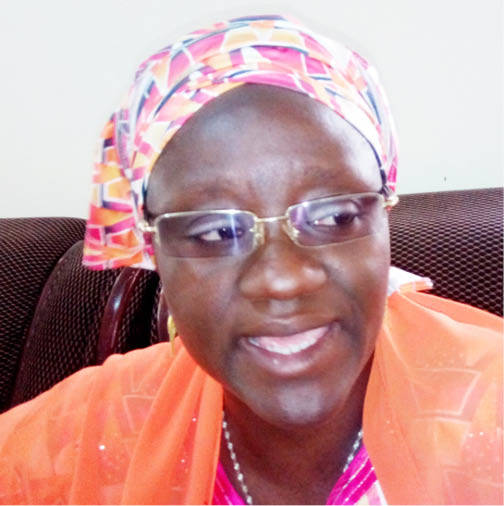‘Inadequate manpower, electricity major challenges in Kwali hospital’
Dr. Halima Bello is the Chief Medical Director (CMD) of Kwali General Hospital. She is a consultant obstetrician and gynecologist/fistula surgeon. In this interview, she speaks about how she transformed the hospital through the support and cooperation of her staff. She, however, said epileptic power supply and inadequate staff were major challenges. Excerpts: How is […]


Dr. Halima Bello is the Chief Medical Director (CMD) of Kwali General Hospital. She is a consultant obstetrician and gynecologist/fistula surgeon. In this interview, she speaks about how she transformed the hospital through the support and cooperation of her staff. She, however, said epileptic power supply and inadequate staff were major challenges. Excerpts:
How is service delivery under your watch at the Kwali General Hospital like?
Since I assumed office as the Chief Medical Director of Kwali General Hospital 11 months ago there have been a lot of achievements and challenges. Starting with the aspect of the challenges is manpower, even as we have been able to ensure that, we manage the staff on ground to ensure we give quality service to patients. Besides, in terms of service delivery, we have succeeded in changing the entire face of Kwali General Hospital, which makes our service delivery much more significant and better than we met it a year ago.
Come to the issue of services: we offer services on obstetrics and gynecology; we do surgeries like fistula, among other operations.
We have done surgeries here in this hospital, while like other units such as medical care; we do diabetic treatment, except any case we discover we cannot handle. We now refer such cases to another hospital. However, it was not easy when I came on board. We tried to see that we changed things, and even when you try to change things, there are some people that may not accept it. However, with time, they had to accept it.
What have you achieved so far in these 11 months?
I can tell you that we have been able to achieve a lot in the sense that we now have all our units in a single place like the obstetrics and gynecology complex which has a labour ward and a theatre where three emergencies can run at the same time. We also have ante-natal clinic and ante-natal ward which are all in this complex.
Also, when I assumed office, we decided to establish a pharmacy complex whereby we have a box store, dispensary store and the counselling room.
You can also recall that it was when I came on board that we have been able to put in place a laboratory unit/complex, while the radiology room and the main lab are well equipped.
I can tell you that almost 80 per cent of our units operate independently without obstruction or delay, unlike before when patients were referred to other hospitals due to lack of enough units within the hospital.
I want to also remind you that our accident and emergency unit has been upgraded and all our machines are now functional.
Why do general hospitals no longer offer free ante-natal services?
The issue of free ante-natal services which you are talking about has not changed in terms of service delivery, as we still offer free ante-natal services because any time pregnant women come here, doctors attend to them, and because of the nature of service we offer, pregnant women from Gwagwalada come here. I believe they know that the doctors and nurses that are going to handle them are on ground despite the challenges of manpower. And the charges we offer here are very low, while we don’t ask them to pay for surgery, ante-natal, as all we require them to do is to buy one or two things they will need for surgery.
So as far as Kwali General Hospital is concerned, we offer ante-natal free, even though some four or five years ago, we had women that attended ante-natal from the beginning till delivery without paying a penny: which I know had been done.
However, over the years, the expenses incurred during ante-natal, the government didn’t pay back the money to the hospital. And of course, things are not as easy. Therefore, all we do now is just to try to see any test a pregnant woman wants to carry out, she pays a little fee to enable us get some drugs on ground so that anytime a patient comes, we can use such drugs on the patient.
What are the major challenges that require urgent attention?
Just like I said earlier, in as much as we have a lot of challenges, that is how we have a lot of achievements on ground too, which I highlighted earlier.
In Kwali here, we don’t always have good power supply from the Abuja Electricity Distribution Company (AEDC). In fact, sometimes we stay four to five days without a blink of light, so we run on generator 20 to 22 hours every day and we ensure that we have a generator that will work at night because of patients. We ensure that there is constant light at least from 6:00p.m. to 6:00a.m; and during working hours, from 8:00a.m. to 4:00pm. We now put on the bigger generator that can carry all the machines within the hospital.
So you can see that our income goes to diesel and generator maintenance, as light is our greatest challenge, but I am happy that the secretary for health and human service was here recently on inspection and she went round to see things for herself and has promised to address some of the basic challenges.
Secondly, the other challenge is manpower; just like I said earlier, I am the only consultant in this hospital. So you can imagine that it is not easy on me. In fact, we have 6,000 patients that we see every month and we have only 10 doctors that attend to these patients.
